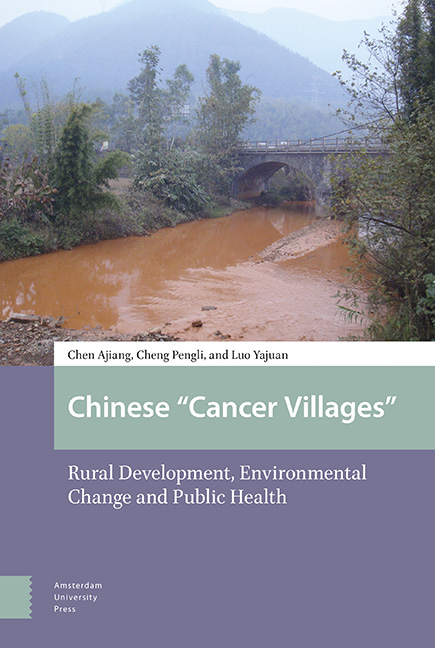Book contents
- Frontmatter
- Contents
- List of Figures, Graphs and Tables
- Acknowledgements
- Preface to the English Language Edition
- 1 Retrospective Thoughts on the ‘Cancer Village’ Phenomenon
- 2 The Ins and Outs of a ‘Cancer Village’
- 3 A Subei ‘Cancer Village’
- 4 Environmental Change and Health Risks
- 5 A Prosperous ‘Cancer Village’
- 6 Coexistence of Poverty and Cancer
- 7 Problematization and De-stigmatization
- 8 Behind the ‘High Incidence of Lung Cancer’
- 9 Villagers’ Perceptions of and Responses to the Relationship between Cancer and Pollution
- 10 Villagers Strategies for Mitigating Environmental Health Risks
- Index
- Index (Chinese) 中文索引
Preface to the English Language Edition
Published online by Cambridge University Press: 20 November 2020
- Frontmatter
- Contents
- List of Figures, Graphs and Tables
- Acknowledgements
- Preface to the English Language Edition
- 1 Retrospective Thoughts on the ‘Cancer Village’ Phenomenon
- 2 The Ins and Outs of a ‘Cancer Village’
- 3 A Subei ‘Cancer Village’
- 4 Environmental Change and Health Risks
- 5 A Prosperous ‘Cancer Village’
- 6 Coexistence of Poverty and Cancer
- 7 Problematization and De-stigmatization
- 8 Behind the ‘High Incidence of Lung Cancer’
- 9 Villagers’ Perceptions of and Responses to the Relationship between Cancer and Pollution
- 10 Villagers Strategies for Mitigating Environmental Health Risks
- Index
- Index (Chinese) 中文索引
Summary
We are delighted that this book is finally seeing the light of day in the English language. As some readers are aware, this has been a long and difficult process, and we are grateful to Amsterdam University Press (AUP) for its support.
Several of the chapters in this book first appeared as journal articles, and in 2013 they were collected in a Chinese language volume, titled ‘Cancer Village Research’. In 2014, Professor Chen and his colleagues signed a contract with AUP for the English version of the book containing additional material, and in 2016 we expanded our original preface to include a discussion of the new material. Although several years have passed, we have chosen to retain that 2016 version here and add just a short coda for the English edition, so that the evolution of the content of the book and our thinking about the topic is clear.
Preface to the 2016 Edition
‘Cancer villages’ are a highly emotive issue. Cancer is a ‘dread disease,’ more frightening to most people than other equally life-threatening illnesses, such as heart or respiratory failure. Since villages generally conjure up images of a natural and healthy rural environment, the idea of their being plagued by cancer is therefore especially unexpected and disturbing. Although poverty has decreased dramatically and the social safety net has expanded in recent years, overall, it is widely acknowledged that rural Chinese have also received fewer benefits from rapid economic development than urban dwellers. Reports of cancer villages suggest that they may also be bearing the brunt of its negative environmental impacts.
Media reports of cancer villages are shocking, citing rapid rises in cancer deaths and showing photographs or film of skeletal victims and grieving families. But how do media accounts and public perceptions of ‘cancer villages’ relate to what we know about the phenomenon from research; and how can research help to address the problem? This book explores these questions.
Although the government has acknowledged that ‘cancer villages’ exist, little is known about them. In the aggregate, cancer rates in China have been rising for some time and data from the Ministry of Health shows that the disease is now the leading cause of death in rural as well as urban areas.
- Type
- Chapter
- Information
- 'Chinese Cancer Villages'Rural Development, Environmental Change and Public Health, pp. 11 - 28Publisher: Amsterdam University PressPrint publication year: 2020



